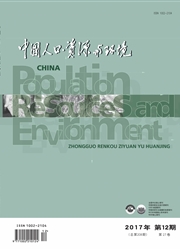

 中文摘要:
中文摘要:
近年来,中国各级政府纷纷加大污水治理力度。并取得了显著成效。2001—2010年间中国工业化学需氧量(COD)排放强度下降了75.91%。分解工业COD排放强度降低的技术效应并进行深入检验.以及检验环保投资在工业COD减排中的作用,对今后的工业COD减排和环保投资都十分必要而迫切。论文使用迪氏对数指标分解法(LMDI),将中国工业COD排放强度降低的技术效应进一步分解为水资源消耗强度效应、水资源重复利用效应和污水处理效应。然后利用2001—2010年中国工业COD排放数据计算这三种效应。发现中国工业COD排放强度降低的技术效应主要归于水资源消耗强度效应,其次是污水处理效应,水资源重复利用效应几乎不存在。进一步。利用这些数据并通过联立方程模型检验了环境基础设施投资、工业污染源治理投资、建设项目“三同时”投资对三种效应的影响作用。研究发现,水资源消耗强度效应主要归于以政府为主的环保投资(环境基础建设投资),而以企业为主的环保投资(工业污染源治理投资、建设项目“三同时”投资)对工业COD排放强度降低的作用还不太显著。也就是说。中国工业COD排放强度降低主要归因于以政府为主的环保投资。因此,未来较长一段时期,政府在扩大环保投资的同时应采取措施带动以企业为主的环保投资.推动工业COD减排从末端治理向全过程管理转变。
 英文摘要:
英文摘要:
In recent years, Chinese government at all levels have increased sewage treatment and got remarkable success. From 2001 to 2010, China's industrial COD (chemical oxygen demand) emission intensity has decreased by 75.91%. It is necessary and urgent to study the effects of industrial COD emission intensity reduction technology as well as the effect of environmental protection investment in industrial COD reduction in order to improve future industrial COD reduction and environmental protection investment. In this paper, the authors decompose the industrial COD emission density into three effects by LMDI method, including water resource consumption density effect, water resource recycling effect and pollution treatment effect. They also measure the three effects based on data of industrial COD emission in China from 2001 to 2010, and find that the decreasing of industrial COD emission density is mainly caused by the decreasing of water resource consumption per unit, with the upgrade of pollution treatment technology ranked the second. The effect of water resource recycling does almost not exist. Further, the authors test the influences of investment in environmental infrastructure, industrial pollution and construction projects on the "three effects" based on the simultaneous equations model. The study shows that, the decreasing of water resource consumption per unit was largely attributable to the government investment in environmental protection (environmental infrastructure investment), and the reduction stimulated by enterprises is not yet significant Therefore, governments should take measures to promote enterprise-based investment in environmental protection, helping the COD reduction treatment transferred from "end" to "process", while expanding investment in environmental protection in the future.
 同期刊论文项目
同期刊论文项目
 同项目期刊论文
同项目期刊论文
 期刊信息
期刊信息
